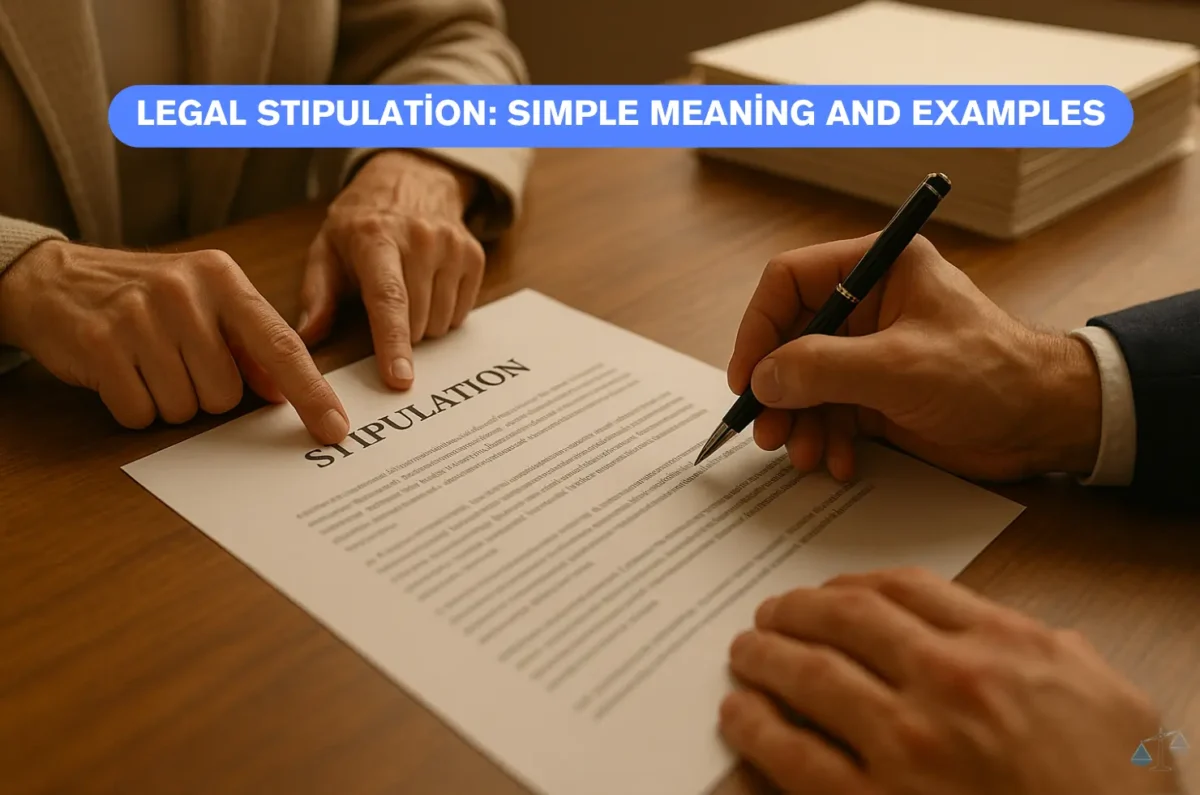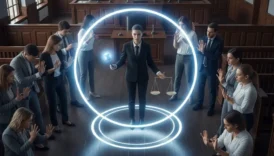Legal Stipulation: Simple Meaning and Examples

Simple definition of a legal stipulation: a formal agreement between opposing parties in a legal proceeding that acknowledges certain facts or procedures as true or accepted, eliminating the need for further proof. It helps streamline cases, reduce costs, and focus on genuine disputes rather than uncontested matters.
“A stipulation simplifies the path to justice by agreeing on what doesn’t need to be fought over.”
Meaning of Legal Stipulation
A legal stipulation is essentially a mutual agreement made by attorneys or litigants during a court case. It acknowledges specific facts, procedures, or evidentiary matters as true, thereby removing the need to prove them through witnesses or documents. Stipulations are binding once entered into the court record and approved by the judge.
These agreements can occur before or during trial, and they may address procedural, factual, or evidentiary issues. For instance, both sides might stipulate that a document is authentic, that a witness’s testimony would state certain facts, or that a case will proceed under a specific jurisdiction.
Common examples include:
- Stipulating to the authenticity of exhibits (e.g., contracts, emails, photographs)
- Agreeing on procedural deadlines or scheduling matters
- Confirming jurisdiction or venue
- Establishing facts that are not disputed, such as dates or ownership
- Setting terms for discovery or evidence exchange
By removing uncontested issues from debate, stipulations save time and narrow the focus of litigation to the core disputes.
The Legal Framework for Stipulations in Practice
A stipulation’s power comes from its contractual nature—it’s an agreement, but one that exists within a judicial framework. Courts encourage stipulations because they improve efficiency and conserve judicial resources. However, they are subject to oversight: a judge can reject or modify a stipulation if it conflicts with law or public policy.
Core Types of Legal Stipulations:
- Procedural Stipulations: Agreements about how the case proceeds—deadlines, filings, or discovery methods.
- Evidentiary Stipulations: Agreements on admissibility or authenticity of evidence.
- Factual Stipulations: Agreements on certain facts being true, eliminating the need to prove them.
For example, in a contract dispute, both parties may stipulate that the contract was signed on a certain date. This allows the court to focus on whether the contract was breached, rather than verifying the signing date.
Enforceability
Once a stipulation is filed and accepted by the court, it becomes binding. Either party can rely on it, and it may not be withdrawn without court approval or mutual consent. Breaking a stipulation without proper grounds may result in sanctions or loss of credibility before the court.
Courts view stipulations as a reflection of good faith litigation conduct—they show that parties are willing to cooperate on procedural matters even while contesting substantive issues.
Practical Applications for Legal Stipulation
In everyday legal practice, stipulations play a crucial role in streamlining cases and minimizing unnecessary disputes. Lawyers use them to agree on facts that are easily verified or unimportant to the central issues.
Typical Examples in Practice:
| Type | Example | Purpose |
|---|---|---|
| Procedural | Agreeing to extend a filing deadline | Prevents motions for extensions |
| Evidentiary | Accepting that a photo is genuine | Avoids time-consuming authentication |
| Factual | Admitting a date of event | Narrows trial focus |
| Settlement | Defining terms of partial resolution | Simplifies multi-issue disputes |
These agreements can also appear in settlement contexts, where stipulations outline which claims are resolved and which remain active. Similarly, in criminal law, a defendant might stipulate to certain prior convictions or forensic results to simplify proceedings.
Benefits
- Saves time and reduces costs
- Avoids unnecessary witness testimony
- Enhances credibility before the court
- Encourages cooperation and professional courtesy
Risks
- Poorly worded stipulations can unintentionally concede more than intended
- Once entered, withdrawal is difficult
- Misunderstandings about scope may harm a case
To mitigate these risks, attorneys must draft stipulations clearly, ensuring all parties and the court understand the exact scope and effect.
Legal and Practical Importance
Legal stipulations promote judicial efficiency and fairness. By acknowledging undisputed facts or agreeing on procedure, they allow courts to focus on real controversies. They also reduce the emotional and financial strain of litigation for clients and make proceedings more predictable.
Their broader significance lies in how they reflect the collaborative side of adversarial law—showing that even opponents can cooperate in pursuit of justice. Many judges view well-prepared stipulations as a sign of professional integrity.
However, stipulations must always align with the law and cannot override statutory requirements or constitutional protections. Courts will reject agreements that attempt to waive essential rights or contradict public policy (for example, stipulating guilt in a criminal case without proper safeguards).
Ultimately, stipulations embody practical wisdom in litigation: they simplify what’s agreed upon, clarify what’s not, and advance the efficient resolution of disputes.
Limitations and Ethical Considerations
While stipulations are powerful tools, they require careful ethical handling. Lawyers must ensure clients understand what they’re agreeing to and the consequences of each stipulation. Ethical rules forbid making stipulations that mislead the court or misrepresent facts.
Common ethical guidelines include:
- Obtain informed consent from clients before agreeing to material facts.
- Ensure stipulations are truthful and based on verified information.
- Avoid using stipulations to conceal wrongdoing or manipulate outcomes.
- Maintain transparency with both the client and the court.
Failure to comply may lead not only to court sanctions but also to professional disciplinary actions.
In short, stipulations work best when grounded in clarity, honesty, and respect for the judicial process. They remain one of the most effective tools for efficiency in law—when used responsibly.
FAQ — Legal Stipulation
What is the main purpose of a legal stipulation?
Its main purpose is to simplify legal proceedings by agreeing on facts, evidence, or procedures that are not in dispute. This helps save time, reduce costs, and focus the case on real disagreements between the parties.
Is a stipulation legally binding?
Yes. Once a stipulation is filed with and approved by the court, it becomes legally binding. Neither party can withdraw from it without the other’s consent or the judge’s approval.
Can a stipulation be oral or must it be written?
While some stipulations can be made orally in court and recorded by the judge, written stipulations are preferred. Written agreements reduce confusion, provide clear records, and are easier to enforce if disputes arise later.
What are the types of stipulations in law?
There are generally three:
Procedural stipulations – covering deadlines or filings
Evidentiary stipulations – agreeing on admissibility or authenticity of evidence
Factual stipulations – agreeing that certain facts are true and undisputed
Can a stipulation be changed or withdrawn?
Only under limited circumstances. A court may allow withdrawal if a stipulation was made by mistake, obtained through fraud, or would cause injustice if enforced. However, these exceptions are rare and require strong justification.
How does a stipulation affect the outcome of a case?
A stipulation doesn’t decide the case itself, but it can narrow the issues and sometimes remove entire disputes from contention. This can significantly shorten trials and make the outcome more predictable.
Are stipulations used in both civil and criminal cases?
Yes. In civil cases, they help streamline discovery or trial preparation. In criminal cases, stipulations can confirm evidence or prior facts, but they cannot waive fundamental rights without clear consent from the defendant.
Who prepares the stipulation?
Usually, attorneys for both parties draft and sign the stipulation, then file it with the court for approval. Judges may also suggest or encourage stipulations during pretrial conferences.
Can a judge reject a stipulation?
Yes. Courts may reject stipulations that conflict with the law, violate public policy, or unfairly prejudice one party. Judges retain ultimate control over what becomes part of the official record.
Why are stipulations important in legal practice?
They promote efficiency, professionalism, and good faith among litigants. By agreeing on uncontested facts or evidence, lawyers demonstrate cooperation and allow courts to concentrate on true areas of dispute.
Author & Editorial Note
Author: LegalTerms Editorial Team
Last Updated: October 2025
Disclaimer: This content provides general educational information about legal stipulations. It does not constitute legal advice.
Table of Contents for Legal Stipulation
Keywords For Legal Stipulation
- Legal Stipulation
- Meaning of Legal Stipulation
- The Legal Framework for Stipulations in Practice
- Practical Applications for Legal Stipulation
- Legal and Practical Importance
- Limitations and Ethical Considerations






